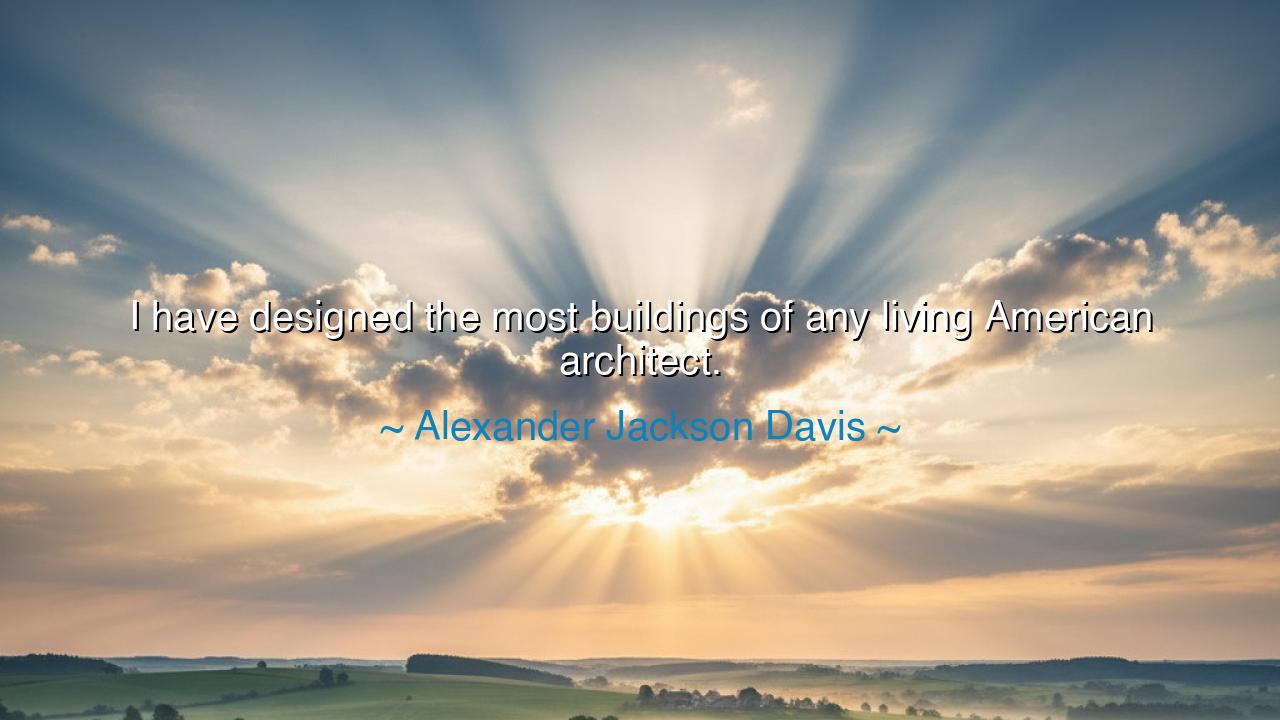
I have designed the most buildings of any living American






Host: The morning light filtered through the dusty curtains, casting long shadows across the room. Outside, a soft breeze rustled the leaves of the trees, while the air felt thick with the weight of the unspoken. Inside, Jack leaned against the window, his arms folded across his chest. The quiet of the space contrasted sharply with the thoughts swirling in his mind. Jeeny sat at the small table, her hands wrapped around a cup of tea. Her eyes glimmered, intense but calm, as if searching for something deeper, something beyond what was visible.
Jeeny: “Do you really believe someone could claim to have designed the most buildings of any living architect, and not be weighed down by that pride?”
Jack: “I don’t know, Jeeny. Ambition and pride are just part of the game. If you’ve spent your life creating structures, marking your place in the world, wouldn’t you say that’s what matters most? That’s the measure of success. The number of buildings.”
Jeeny: “But that’s the problem, Jack. Success isn’t about the number of things you’ve built. It’s about the meaning behind them. The heart. I’m sure you’ve heard of Alexander Jackson Davis—he designed countless buildings, but if his designs didn’t serve a greater purpose, what’s the point?”
Jack: “Purpose? Look, I get it. You want emotion, meaning. But in the end, it’s about results. How do you measure a person’s legacy if not by the tangible? You’re acting like every building should come with a moral lesson or a sense of deep reflection. But it’s about the vision, the execution, the work. Davis himself probably never even thought about the meaning of his creations—he just built.”
Jeeny: “And that’s just the problem, isn’t it? We celebrate the achievement without considering its impact. Davis designed buildings, yes, but how much of that was driven by his own need for recognition? What about the communities these buildings affected? What about the people who lived in those spaces? Did they feel seen, or were they just part of someone else’s legacy?”
Host: Jack’s fingers tighten around the glass, his jaw setting in a way that speaks of internal resistance. The air between them grows heavy, the silence pressing down on their words like a storm cloud just before it bursts.
Jack: “You’re so idealistic, Jeeny. You think everything in this world should have some higher meaning, but sometimes it doesn’t. Some things are just done because they need to be. People work because they have to. It’s not always about making a difference. It’s about doing what you can, what you’re good at. Davis made an impact, and whether you like it or not, his buildings stand as proof.”
Jeeny: “But at what cost? Do we just celebrate something because it’s there, or do we stop and ask if it matters? I’ve seen too many buildings that stand as symbols of progress, but inside, they’re empty. People walk by them, unmoved, because there was no care put into their creation. You can measure a building’s success by its effect on the people who experience it. A building that feels right, that reflects its environment, that’s something truly special.”
Jack: “So you want empathy in architecture, is that it? You think a designer should be a philosopher? You want the soul of every project to reflect the needs of the world? It’s not that simple.”
Jeeny: “But isn’t that the point, Jack? If it’s not about people, then what’s it all for? To make the wealthy feel good, to make them immortal in their own minds? I’m not saying a designer can’t be proud, but what’s the real cost of success?”
Host: The light shifts slightly, casting new shadows across their faces. Jack’s gaze drifts toward the window, but his thoughts seem lost in the distance, far away from the world around him. Jeeny’s voice, though soft, cuts through the growing tension, a soft whisper in the heavy air.
Jack: “I get your point, Jeeny. I do. But the world doesn’t just work on idealism. We need to build. We need to construct something lasting. People can debate whether it’s right or wrong, but in the end, something was created. And it matters.”
Jeeny: “It matters if it connects. If it offers something that people can hold onto, that doesn’t just stay empty. Legacy isn’t just about things we leave behind, Jack. It’s about the soul we put into the things we make.”
Host: The silence stretches between them, thick with the weight of unspoken understanding. Outside, the sun climbs higher, its rays slicing through the early mist. Jack shifts, his shoulders dropping as if some of the weight he carried had lifted, even just a little. Jeeny watches him, her expression softening, the sharpness of their previous words beginning to fade.
Jack: “I guess we both have our own ways of seeing it, don’t we? I still think progress is measured by what we do, but I see where you’re coming from. It’s about the human side of things, the heart.”
Jeeny: “And I guess it’s about the balance. We need the buildings, Jack. But we also need the people they’re built for. Success is finding the intersection.”
Host: The air seems to clear, and as the sun rises higher, the quiet between them is no longer heavy, but reflective. Jack exhales slowly, his eyes meeting Jeeny’s. For a moment, they both sit in the quiet of that shared understanding. The world outside continues, the buildings rising, the people walking past them—each with their own story, their own measure of what matters.
Host: As the day continues, the two of them sit in the warm, gentle light—their differences no longer dividing them, but offering a new perspective on the world they both inhabit.






AAdministratorAdministrator
Welcome, honored guests. Please leave a comment, we will respond soon